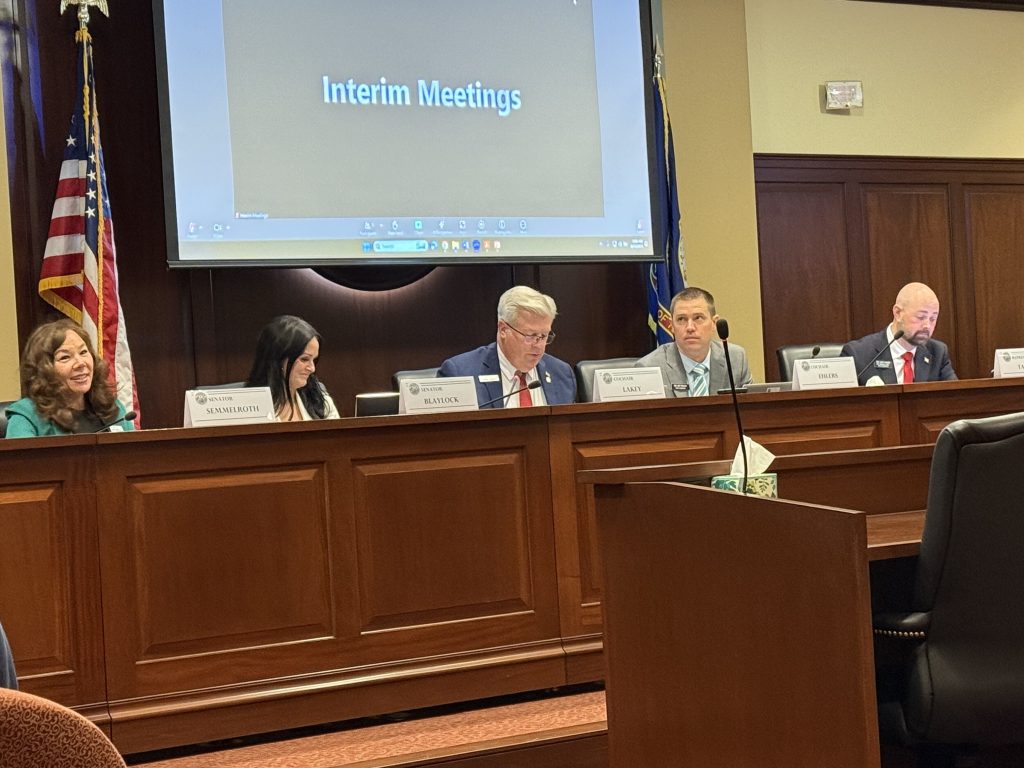Have you ever had a list of tasks so long that you end up not getting anything done? Analysis paralysis is a constant problem when you have too much to do. Getting things done requires prioritizing the most important tasks and then—most importantly—actually doing them.
The DOGE Task Force has a huge job on its plate: significantly reducing the size, scope, and cost of state government. While there is surely plenty of low-hanging fruit to tackle first, the danger is that the committee will set its sights so high that it fails to accomplish anything. After yesterday’s second meeting of the task force, I’m convinced they can do some good things—so long as they properly prioritize their options.

Yesterday’s meeting began with testimony from Ryan Langrill, director of the Office of Performance Evaluations (OPE). OPE was created in 1993 by the Legislature as a nonpartisan agency tasked with conducting evaluations of state agencies, programs, and policies to support lawmakers as they consider legislation. OPE is overseen by the Joint Legislative Oversight Committee—check it out at Idaho Insider for more information.
Director Langrill shared some of OPE’s past work, including saving more than $30 million by proposing a shift in the Idaho Transportation Department (ITD) from reactive to proactive maintenance, as well as an drafting a complete overhaul of procurement procedures in 2013. Langrill noted that constitutional offices—such as the governor and attorney general—were exempted from the Procurement Act of 2016, but the Legislature could pass a law next session requiring them to follow the same standards and practices.
Sen. Camille Blaylock asked about the rollout of Luma, the new payment processing system that has seen numerous issues since its introduction. Langrill said that because the state controller is a constitutional officer, the office was not bound by the Procurement Act, but had it followed OPE’s recommendations, the rollout could have gone better.
Blaylock also asked about the transition to Medicaid managed care, as set in motion by House Bill 345 this year. Langrill said the transition comes with risks, as there are many opportunities for overspending, but the status quo carries its own risks as well.
Next up were Ryan Bernard and Katie Stuart from the Division of Occupational Licensing (DOPL). Bernard explained that even after consolidating numerous agencies under one roof, DOPL still issues 286 licenses and certifications in Idaho. Rep. Jeff Ehlers, co-chair of the task force, expressed astonishment at the high number.
Rep. Josh Tanner asked about moving more administrative rules into statute. Bernard and Stuart replied they were reviewing their options. Tanner pointed out that many DOPL rules are only 1–2 pages long and suggested they would be better served in statute. He also asked which additional boards could be consolidated or eliminated. Bernard and Stuart replied that DOPL would be supporting additional consolidation bills in the next legislative session.
Co-chair Sen. Todd Lakey added that some boards might need to be eliminated entirely, rather than just consolidated.
Keith Bybee, manager of the Budget & Policy Division in the Legislative Services Office (LSO), spoke next, presenting a spreadsheet showing average vacancy rates for full-time positions in state agencies. I acquired a copy of the report, which you can view and download here:
Bybee stressed that the important measure was not necessarily the number of current vacancies, but the five-year average compared to what the Legislature appropriated. The report also includes columns showing how much money the Legislature appropriated to each agency for personnel, and how much of that each agency has used over the past five years. Bybee said the report was necessary to give a broader view of staffing in government agencies.
Sen. Lakey asked what a reasonable threshold for staffing would be. Bybee said about 95% was appropriate for larger agencies, while smaller ones—for example, the Office of the Lieutenant Governor, with only three appropriated FTPs—should probably be closer to 100%, because every employee in such a small agency matters to its core mission.
Rep. Ehlers asked where the money goes that is not spent on appropriated personnel costs. Bybee replied that it could be transferred to other accounts or returned to the general fund—either way, LSO could find that information.
Sen. Carrie Semmelroth, the lone Democrat on the committee, asked if there was a way to track how competitive salaries and benefits for vacant positions are compared to the private sector. Bybee said that on average, state government compensation is about 14% below the private sector, despite generous benefits, though exact figures vary by position.
Sen. Blaylock asked about Idaho Public Television’s 168.33% average of filled positions. Bybee explained that because much of their revenue comes from private donations, they employ more staff than the Legislature directly appropriates.
Rep. Heather Scott asked about personnel information for public colleges and universities, which is incomplete on the spreadsheet. Bybee said they use a different payroll system, and while LSO receives regular updates, it cannot simply pull the same data as it can from Luma.
Finally, Rep. Tanner reiterated his request for long-term vacancy data to determine how much personnel each agency really needs, and added that he wanted to end the Covid-era work-from-home policies that have left many state offices empty and unused.
The final presenter was Alex Penny from the Impact Review Team at LSO. He reported that members of the public had submitted 435 ideas via the Government Efficiency Portal, and he and his team had categorized them for the committee’s use. Members asked about potential whistleblowers from within state agencies, to which Penny said they would try to set those aside for special consideration. Rep. Dustin Manwaring urged state employees to share their ideas.
Penny also discussed the looming deadline for agencies to submit lists of outdated and unnecessary code pursuant to House Bill 14, passed earlier this year. Agencies have until September 1 to submit their lists. Penny highlighted the Office of the State Treasurer, which completed its work early. One suggestion from Treasurer Julie Ellsworth was to eliminate a law requiring deposits in a reputable bank based in New York.
Penny said he would send weekly updates to the task force as submissions come in, and that the committee should have actionable data prior to the next meeting in late September.
By the next meeting, the DOGE Task Force should have enough information to propose numerous bills for the 2026 legislative session. As engaged citizens, we must properly calibrate our expectations. As I said after the last meeting, we’re not going to see them abolish government entirely. If that’s what you expect, then you’ll inevitably be disappointed. However, we should not place our expectations too low either. This committee has an opportunity to accomplish significant reform of government that nudges it back toward its proper scope and role while saving tax dollars.
The Idaho Freedom Foundation (IFF) released a report to the task force outlining several concrete proposals that could be accomplished in the next session. They want you to sign up for their email list to receive the report, so I won’t steal their thunder. The proposal includes 15 ideas for consolidation, 16 agencies to eliminate, and 5 suggestions to reduce state employee positions.
Its top recommendation is to repeal Medicaid Expansion, which costs more than a billion dollars in combined state and federal funding. During closing remarks, Sen. Lakey asked Rep. Tanner, who sits on the Medicaid Review Panel, if that committee would be looking at repeal. Tanner replied that, although members are discussing the idea, it would not likely be part of the panel’s formal recommendations. Lakey suggested that repeal ought to be on the DOGE agenda, and Tanner agreed.
It’s unfortunate that IFF disparaged the DOGE Task Force before it had even met for the first time, because its proposal contains some great ideas. I would hate for any of them to be ignored out of a desire to avoid giving IFF credit. Personally, I don’t care who gets the credit, so long as good things happen.
What do you think? If you were on the DOGE Task Force, how would you rank its priorities? I believe that, following the September meeting with the code cleanup proposals in hand, the committee will have all the information it needs to propose legislation for the 2026 session. Earlier this month I laid out my suggestions for how you can help the task force in its work:
- Pick one state agency
- Explore it via Transparent Idaho
- Examine reports yourself, or export them and analyze them with AI tools
- If you find waste, duplication, or inefficiency, submit your findings to the Government Efficiency Portal
- Prepare to testify at the next DOGE Task Force hearing regarding your findings
The second meeting did not include public comment, but you can still follow up your portal submissions with the committee itself. Visit the DOGE Task Force page at Idaho Insider for information on the members and a link to email them all at once.
Reforming government, cutting spending, and shrinking the bureaucracy are possible. Accomplishing these things requires more than courage—it takes hard work. I appreciate the members of the task force for being part of the solution. Now, it’s time to get results.
Gem State Chronicle is a reader-supported publication. To receive new posts and support my work, consider becoming a free or paid subscriber.
About Brian Almon
Brian Almon is the Editor of the Gem State Chronicle. He also serves as Chairman of the District 14 Republican Party and is a trustee of the Eagle Public Library Board. He lives with his wife and five children in Eagle.













